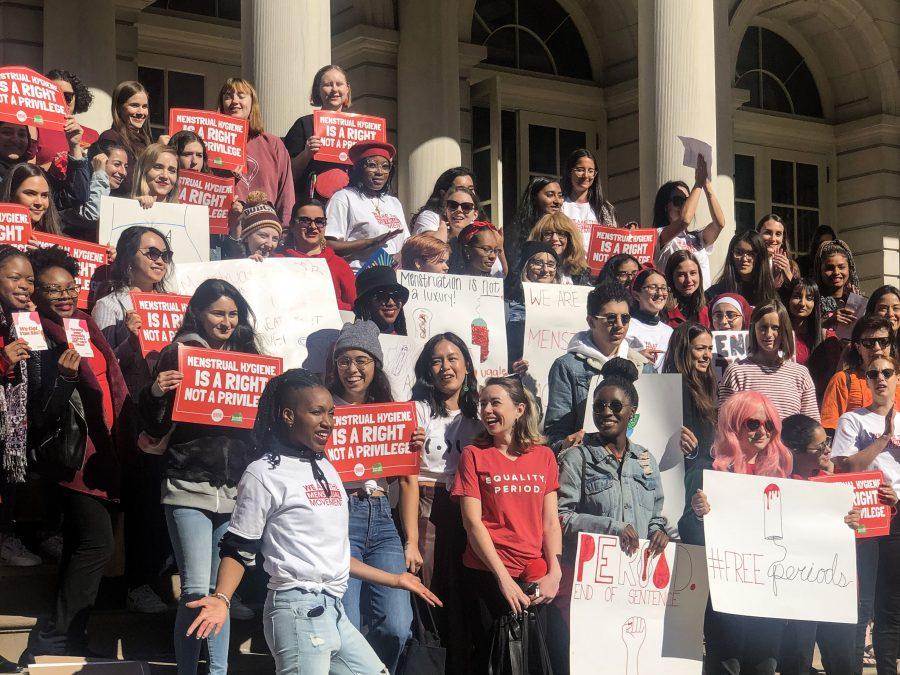Protestors parted a Red Sea of T-shirts and signs on Saturday, sporting the color for the first New York National Period Day rally outside City Hall meant to bring awareness to often-stigmatized topics surrounding menstruation.
Organized by PERIOD inc., a menstrual equity advocacy group founded by two 16-year-olds, National Period Day aims to increase accessibility to menstrual products and draw attention to issues such as period poverty — when low-income individuals cannot afford menstrual products — and gender equity. Rallies took place in every state across the U.S. on Saturday.
“There still is this idea that a period product is a luxury item, which couldn’t be further from the truth,” New York National Period Day organizer Heneen Attal told WSN. “For this rally, we’re raising awareness just so that we can continue the movement to end menstrual poverty and the tampon tax around the world.”
Thirty-four U.S. states still tax tampons, not considering them a necessity worthy of tax exemption. New York is among the 16 that do not and a few weeks ago became the first state to require menstrual product companies to disclose the ingredients used in their products as they can contain toxic chemicals.
Activists say New York still has much to improve on in terms of increasing menstrual product accessibility for marginalized communities and providing more free hygiene products in schools.
New York State Assemblymember Linda Rosenthal — who first introduced legislation to remove the tampon tax in 2015 — said that she applauded participants for their willingness to talk about menstrual issues, citing the pushback she faced when she first debated the bill on the floor.
“When I introduced the bill to ax the tampon tax in 2015, using words like ‘blood’ and ‘gush,’ there was silence and there were snickers,” Rosenthal said in a speech. “If you say you bleed and you might need a menstrual product, that should be perfectly normal because it’s a biological function, nothing to be ashamed of.”
Activists emphasized a need to address stigma when discussing menstruation, an issue CAS ’19 alumna and founder of Catcalls of NYC Sophie Sandberg works to eradicate through her chalk art.
Catcalls of NYC is an Instagram account and activist movement that draws attention to the issue of verbal harassment on the street. Members document real catcalls by writing them on city sidewalks in chalk. Sandberg did a series of menstruation-related chalk drawings at the event.
She started this initiative four years ago as a first-year at NYU. The account has garnered nearly 200,000 followers since.
Sandberg said a lot of the issues mentioned during the rally are parallel to those that arise from harassment.
“The thing about sexual harassment and the thing about period poverty and stigma is that people don’t talk about them enough,” Sandberg told WSN. “I’m really passionate about creating space for people to share stories publicly on the sidewalks, and that works for catcalling but [it] also works for people talking about their periods.”
New York City-based artist Ada Reso, who attended the rally, uses artwork to raise awareness for menstrual health by painting with her own period blood.
“[My paintings are] dancing figures that I created in response to my cycles and trying to become better connected to my body as a sort of political and social resistance,” Reso told WSN.
Reso said she came to the event because she felt that menstruation intersected with issues such as transphobia and misogyny in healthcare, hoping to draw attention to the fact that menstruation is an issue that does not just apply to cisgender women.
In an interview with WSN, PERIOD inc. Policy Coordinator Ameer Abdul echoed the sentiment that periods are not just a woman’s issue.
“This is a human rights issue, something we should be pushing forward,” Abdul said. “[Menstrual products are] arguably just as important, if not more important, than toilet paper.”
The issue of menstrual hygiene product accessibility is long-running at NYU. In 2016, NYU Student Senators Council passed a resolution that proposed a budget to provide free menstrual products across campus. The resolution came after WSN published an op-ed written by NYU Students for Sexual Respect Co-founders Josy Jablons and Megan Racklin and a petition circulated that had over 3,000 signatures.
The Student Health Center website lists 10 restrooms and seven offices that supply free menstrual products for students. Students are instructed to take only what they need from restrooms, while at offices they can stock up on supplies for long-term use. Some of the listed bathrooms may be mislabeled, such as one on Kimmel’s seventh floor, which as of February 2018 still charged 25 cents per product.
Gallatin junior Rebecca Samet, who participated in New York National Period Day, agreed that menstruation is a human issue and found speakers’ anecdotes to be personally relatable. She recounted having to make makeshift pads out of toilet paper when menstrual products were not freely available, an experience mentioned during several speeches at the rally.
She added that she believes New York’s legislation on period product accessibility needs to be more strictly enforced, mentioning that she still often has to leave university buildings when she is on her period as most NYU facilities still charge for menstrual products in their bathrooms.
“When I go to the Bobst Library at NYU there are still those 25 cent machines and it’s completely unacceptable,” Samet said. “It’s one thing to actually pass legislation and say ‘Yeah, it’s here, we don’t have this tax anymore it’s amazing,’ but it’s another thing to make sure it’s actually implemented in all these buildings.”
A version of this article appeared in the Monday, Oct. 21, 2019 print edition. Email Lisa Cochran at [email protected].























































































































































